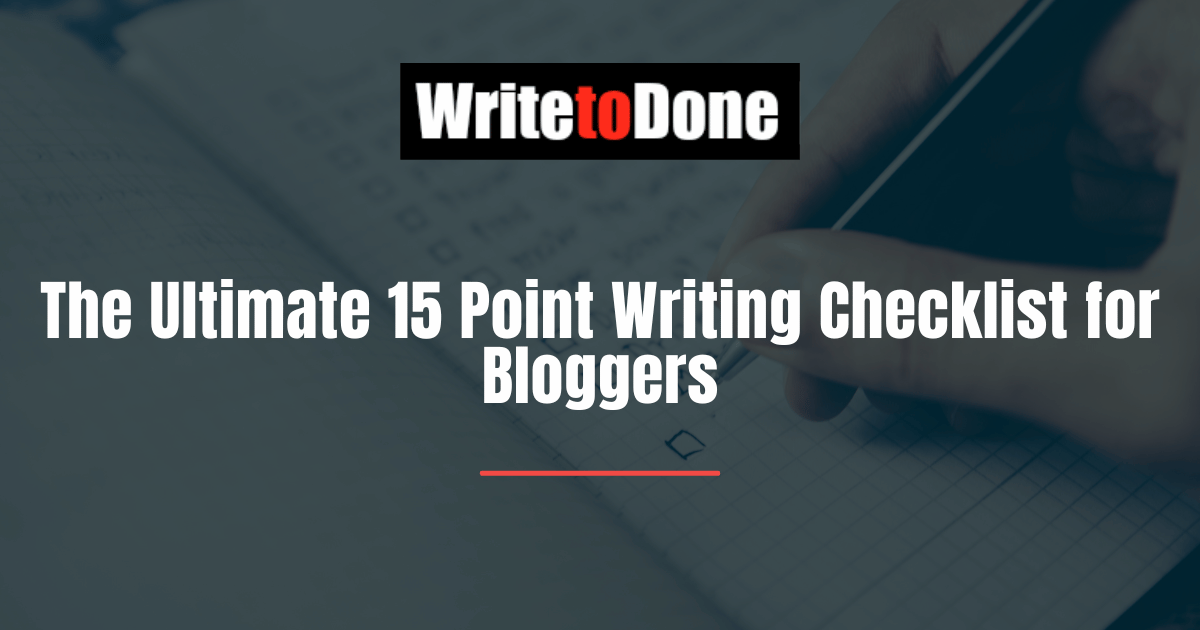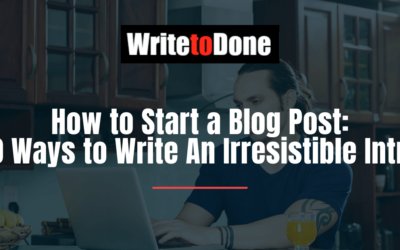Here is a writing checklist for you. You’ll find it super useful as a blogger.
Maybe you’ve defeated all the noises that play havoc inside your head, and finally put down something on paper – you have written a piece.
First of all, a big congratulations to you. First drafts are often the easiest to write provided you have understood them for what they are; just the first drafts – the initial write up. You will have many of them.
According to Natalie Goldberg of Bird by Bird and Writing Down the Bones, they are almost always shitty and you don’t know what your finished piece looks like – yet. But that’s ok, because now the real work of writing starts.
Gather your draft and start editing. This is where craft and structure begin.
The Writing Checklist
#1 Read Aloud
Read the text aloud to yourself. You will discover many inconsistencies in your writing that you will not be able to discover otherwise.
Sometimes, your writing will feel jittery and you may stumble over words. Make a note of it all. Aim to read it without watching it fall flat.
Read each piece at least once, listening for crazy sentences. Rewrite more by simply saying out loud what you are really trying to say.
#2 Read for Voice
Have you found your voice yet, or are you still working on it? Either way, read your draft to see if it sounds like you.
Can your voice be heard? Does your writing resonate with the sound of your voice? Can your reader guess it might be you who have written the post? If not, rewrite to let your personality shine through.
A strong voice will add authenticity to your work. Choose your words carefully and soulfully. Readers always appreciate this quality in writing.
#3 Keep Your Readers in Mind
Who have you written this piece for? Imagine them when you are reading it again.
Is your language appropriate? Have you confused or patronized them, appeared sexist? Have you said anything that might not sit well with your audience?
You want to be considerate of your audience – neither appearing to be snobbish, nor talking to them like you would to a child. Show your respect for your readers.
Keeping their faces in mind, change any sections that you have doubts about.
#4 Is your Lead Right?
Is your lead like bait that will pull your readers in or something that would repel them?
When you are writing a narrative, you are telling a story. Your beginning needs to pull the reader in. Let your reader know what your piece is about.
Clue them in early so they know exactly what to expect. They need to go through the experience with you. If kept in the dark for long, they might lose interest quickly and drift away. Provide them with details that will invoke their interest in the topic.
#5 Is Your Conclusion Right?
What is the point to your writing?
Through your insights or your take on something, the reader can connect with the experience you write about. The ending needs to bring them some understanding and insight, or lead to a slight shift in awareness. If your writing doesn’t do anything like that, you need to revisit its purpose.
You need a beginning, a middle and an end – its that simple. Pay attention to your ending, you must get it right. If you are not happy with it, rework it.
#6 Smooth Out Changes in Tone
Your tone is your attitude towards the topic, reader and yourself. It is impossible to write without a tone – it is apparent in the selection of your words.
Your voice, tone and structure will emerge as you write. It’s impossible to do that in your head. You have to have a first draft in front of you to begin your critique. Only by writing, you will be able to figure out what works and what doesn’t.
Read again to see if there are any many clashes in tone. Decide on the dominant one and keep it constant throughout. Make sure your writing maintains a consistent tone.
#7 Use Verb Contractions
If your tone allows it, if the rhythm permits it, use contractions to lighten your prose. Instead of saying ‘You were not even listening, say you weren’t even listening to me. Replace I will come with I’ll come and so on.
#8 Look at Paragraphs Again
Does your paragraph have a topic sentence that supports one point for the whole paragraph?
Each paragraph should be a series of sentences exploring one main idea. Every sentence should relate to that main point. New thought? Start another one.
Your paragraphs should connect with each other in a logical, seamless flow. Use transitions to logically connect one paragraph to another.
Vary the length of your paragraphs to make them more interesting.
#9 Vary Length of Sentences
Have you varied the length of your sentences? Give your reader’s mind and eye a rest by doing that. Split long sentences into two to make them reader friendly.
#10 Fix Run-on Sentences
A run-on sentence is not necessarily one that goes on and on. It is perfectly fine to craft long sentences.
A run-on sentence is when two or more clauses (complete meanings) are joined by a comma instead of being separated by a full stop. You can also use a conjunction to connect the clauses.
I went to a party, I was really exhausted. This is a run on sentence, it has two complete ideas.
I went to a party. Afterwards, I was really exhausted. Or
I went to a party but I was really exhausted afterwards. Both are correct.
Get rid of any run-on sentences and excessive commas. Use full stops more boldly. Could you improve your sentences by restructuring them?
#11 Get Rid of Clichés
Cliches are sprinkled in to make your writing feel professional, often it does the opposite.
The only thing that your writing needs is that it is honest and specific. You don’t have to use fancy, clever or literary language.
Instead of using cliches, aim to write to surprise your reader. Say something unexpected, use humour and delight them, and enjoy yourself in the process.
#12 Use Exclamation Marks Sparingly
You need emotion in your writing: anger, grief, frustration, embarrassment, fear, love are all that makes it interesting. However, don’t try to bring attention to them by using exclamation marks. Use strong, vivid words to communicate that instead.
A sentence that falls flat without using an exclamation mark, is a flat sentence. It should have the same impact, even when you take the exclamation mark away.
#13 Check for Qualifiers
Check your use of adjectives and qualifiers (words that precede qualifiers) such as very, little, quite, rather, just, indeed etc.
Use strong words, use them with authority.
#14 Eliminate Unnecessary Words
We use thousands of unnecessary words in our writing. Go back and revise, cut everything that you can without affecting the meaning and the message in your piece. If you won’t notice its gone, remove it.
Every single word must pull its weight. Tighten your prose. Eliminate repetitious information.
#15 Proofread
Finally, proofread. Make any last minute corrections.
Give it at least twenty four hours. Its handy to change the font, size or colour when you do. The text will feel fresh, like you are reading it for the first time.
Many people still rush through this stage and inevitably end up with typos and other mistakes in their writing. Be thorough, use a spell-check.
You know you are done, when you have done the best you can. Relax, and be proud.

















